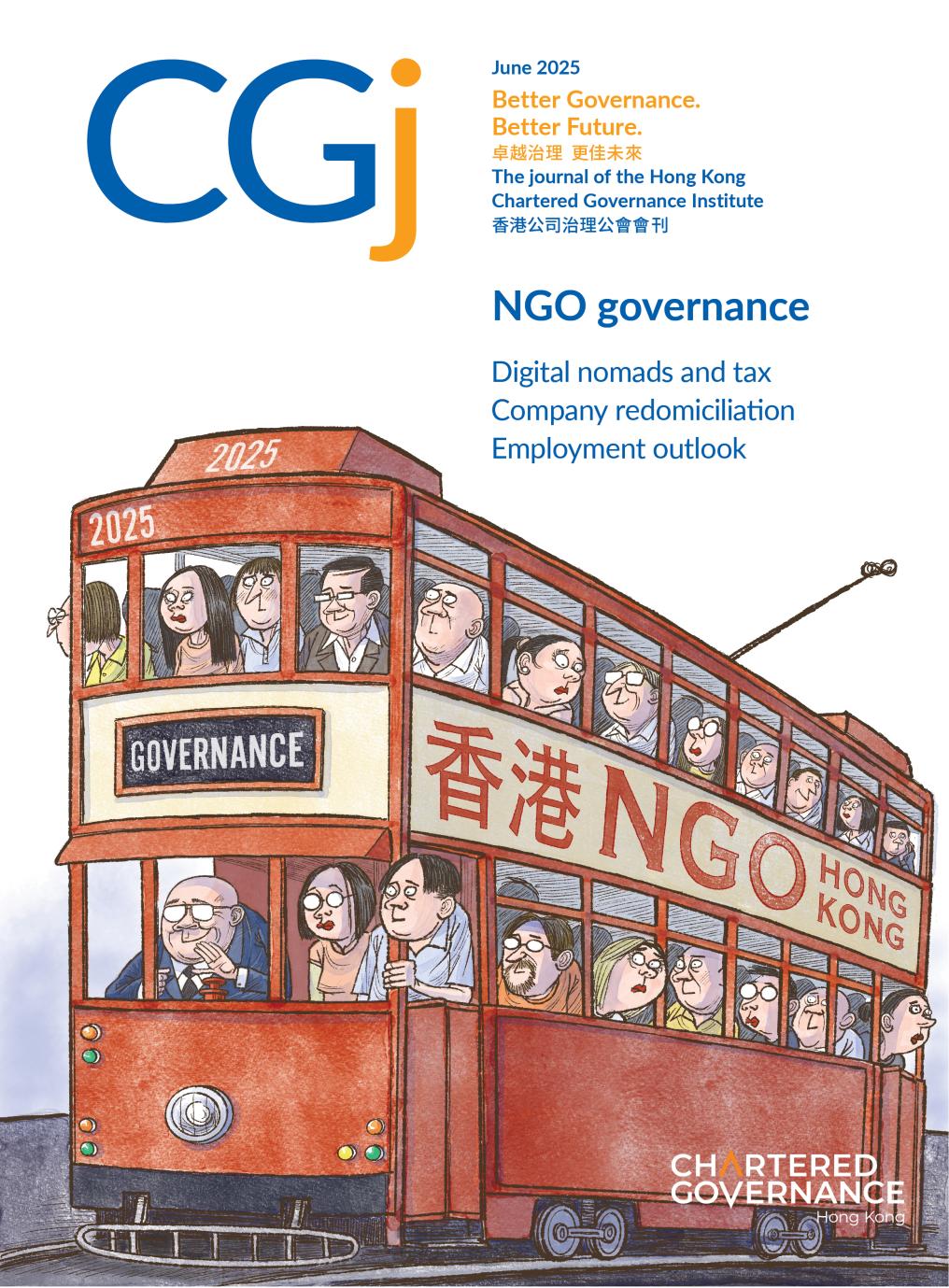
NGO governance in Hong Kong
Patricia Hui FCG HKFCG(PE), lawyer and governance professional, explores the challenges faced by NGOs in Hong Kong and offers a set of practical steps for enhancing accountability, transparency and resilience.
Highlights
- the absence of a formal charity commission or governance code presents challenges for NGOs in Hong Kong, potentially undermining public trust and donor confidence
- strong governance frameworks, including clear policies, effective board dynamics and robust financial management, are vital for building trust and organisational sustainability
- leveraging technology and fostering collaboration among stakeholders can improve impact, transparency and adaptability in the NGO sector
Introduction
Non-governmental organisations (NGOs) play a crucial role in addressing a wide range of social, economic, educational and environmental challenges. They deliver essential services and advocate for marginalised and disadvantaged communities, effectively bridging critical gaps in service delivery and advocacy within Hong Kong’s public sector, which strives to meet the diverse needs of its populace.
In recent years, NGOs have encountered a myriad of challenges that mirror those faced by corporations. The competition for funding has intensified, putting significant strain on resources. Many NGOs find themselves without sufficient reserves to navigate external shocks, the recent pandemic being one example. The rapid advancement of digital technology and the greater prevalence of social media have necessitated the implementation of innovative outreach and engagement strategies, requiring considerable investment in skills and infrastructure.
Additionally, the increased scrutiny and expectations from stakeholders, ranging from beneficiaries to the public, is pushing NGOs to demonstrate their measurable impact and transparency akin to corporate accountability. These changes are compounded by political and regulatory pressures that can limit operational flexibility, making it more difficult for NGOs to achieve their missions effectively. In this evolving landscape, the challenges faced by charities underscore the importance of good governance, now more than ever.
Global NGO governance dynamics
The governance of NGOs varies significantly across the globe, shaped by various factors such as legal and regulatory frameworks, historical and cultural contexts, sociopolitical dynamics and operational environments. In many countries, NGOs are subject to regulatory oversight, including registration requirements, financial reporting and compliance with specific operational standards.
Singapore, for instance, set up its office of the Commissioner of Charities (COC) in 2006 to oversee all charities, with a mission of upholding a well-governed and thriving charity sector that has strong public support. The COC ensures regulatory relevance and compliance, while serving as a proactive charity advisory. Singapore’s Charity Council developed the Code of Governance for Charities and Institutions of Public Character in 2007, which aims to enhance the effectiveness of charities and provide board members with guidance to improve their fiduciary competencies. This Code applies to all registered charities in Singapore, and covers key areas like board governance, conflicts of interest, financial management, fundraising practices, and disclosure and transparency.
In the United Kingdom, the Charity Commission for England and Wales functions as the regulatory body for charities. The Charity Commission registers eligible organisations, ensures compliance with legal requirements, investigates concerns and takes action against charities that fail to meet their obligations. The primary regulatory framework is the Charities Act 2011. The Charity Governance Code is a practical tool to help charities and their trustees develop high governance standards.
All NGOs in Australia must meet the governance standards of the Australian Charities and Not-for-profits Commission prior to registration, as well as to retain registration. These standards, which help maintain public trust in charities, require NGOs to operate lawfully, remain charitable, and be accountable and responsible in their operations.
NGO governance landscape in Hong Kong
The NGO landscape in Hong Kong features a diverse array of charitable organisations, including subvented and non-subvented entities, social enterprises and so on. Despite the vibrant presence of NGOs, the absence of a formal charity commission and of a comprehensive charity governance code has raised concerns regarding transparency and accountability within the sector. Operating without a regulatory body to oversee and enforce standards, NGOs in Hong Kong enjoy a considerable degree of autonomy, which can lead to inconsistencies in governance practices. This lack of oversight may result in varying levels of professionalism and effectiveness among NGOs, potentially undermining public trust and donor confidence in the sector.
While various government and non-government institutions have made efforts to provide valuable resources and guidance to promote best practices, their influence does not reach all NGOs operating in Hong Kong. Many smaller or less established organisations may lack the capacity or willingness to adhere to these recommended standards. Consequently, the absence of a unifying charity governance code means that best practices are not uniformly adopted, leading to disparities in how NGOs manage their operations, finances and stakeholder relationships.
This situation highlights the urgent need for a more structured approach to NGO governance in Hong Kong. By enhancing transparency and accountability, ensuring ethical practices and ultimately improving the sector’s effectiveness, Hong Kong can better address pressing social issues.
Common underlying principles and trends
Let’s explore several key principles that form the foundation of effective governance practices for NGOs, whether regulated or unregulated.
- Transparency. Transparency is the cornerstone of good governance. It involves open, prompt and honest communication about an organisation’s operations, decision-making processes, funding sources and financial management, as well as the provision of accessible information to stakeholders, including programme evaluations, challenges and achievements.
- Accountability. Accountability ensures NGOs are answerable to stakeholders, including donors, beneficiaries and the communities they serve. This principle encompasses a commitment to ethical practices, effective resource management and the establishment of clear mechanisms for regular reporting and evaluation to demonstrate impact and efficiency.
- Integrity. Integrity emphasises the ethical conduct of NGOs and is fundamental to building trust with stakeholders. Organisations should adhere to ethical standards, ensuring that their operations align with their mission and values. This includes avoiding conflicts of interest and upholding high standards of conduct.
- Inclusiveness. Good governance practices promote inclusiveness by ensuring that diverse perspectives are considered in decision-making. This can be achieved by boosting diversity in terms of gender, ethnicity, background, experience and skills, as well as diversity of thought within the board and the leadership positions in the NGO. Engaging various stakeholder groups in organisational decision-making ensures their voices and viewpoints are respected and valued, generating a sense of belonging. Meaningful engagement with stakeholders allows programmes to respond to community needs and priorities, thereby enhancing the relevance and effectiveness of NGO initiatives.
These fundamental principles are increasingly shaping global NGO governance trends, indicating a growing recognition of the necessity for ethical and responsible practices in the sector. As the nonprofit landscape evolves, NGOs that prioritise good governance will be better equipped to tackle challenges, seize opportunities and fulfil their social missions. Therefore, it is advisable for NGOs to implement a robust governance framework to enhance organisational capacity, demonstrate accountability, and foster trust and credibility.
Practical steps to implement NGO governance
Here are several actionable steps that NGOs can take to implement and maintain effective governance practices.
Promote a culture of integrity
Promoting a culture of integrity within an NGO is essential for building trust, accountability and resilience. This is especially important during challenging times, such as crises or resource constraints, when a strong culture of integrity serves as a north star to help maintain the organisation’s credibility, strengthen stakeholder relationships, and ensure that decisions align with its mission and values, ultimately enhancing its capacity to navigate adversity effectively.
“Promoting a culture of integrity within an NGO is essential for building trust, accountability and resilience.”
To cultivate this culture, organisations can implement practical measures that cover establishing clear ethical conduct guidelines, providing regular training on integrity and transparency, and encouraging open communication among the board, leadership team, staff and stakeholders. Additionally, creating a safe environment for whistleblowing and recognising ethical behaviour can further reinforce the importance of integrity.
Establish clear governance structures
NGOs should establish clear and effective governance structures. Donors increasingly seek organisations that not only have compelling missions, but also robust governance frameworks to ensure responsible and efficient resource utilisation. A governance manual is an essential tool for delineating clear governance structures and operational procedures.
This involves specifying the roles and responsibilities of the board of directors, various board committees and management, as well as outlining the decision-making processes. Furthermore, the governance manual serves as a reference that spurs a unified understanding of the organisation’s mission, values and strategic objectives, along with the expected behaviour and conduct of board members. A well-structured governance manual also enhances compliance with legal and regulatory requirements, mitigates risk and improves overall organisational efficiency.
Develop policies and procedures
To enhance accountability and transparency, NGOs should develop policies and procedures that guide organisational operations. These policies may cover critical areas such as financial management, risk management, conflicts of interest, anti–money laundering, anti-bribery and whistleblower protections. Regular reviews and updates of these policies are essential to maintaining their relevance and effectiveness.
Foster board dynamics and development
“Conformity is the jailer of freedom and the enemy of growth.”
John F Kennedy
Creating a dynamic board is essential for good governance and impactful outcomes within NGOs. One effective approach is to utilise a skills matrix to identify and recruit board members with diverse expertise. By mapping individual strengths – whether in finance, legal, governance, fundraising or programme development – NGOs can ensure they have a well-rounded board. Embracing diversity of thought is vital for enhancing board dynamics and governance. A board that reflects a variety of backgrounds and experiences is better positioned for creative problem-solving and informed decision-making.
Promoting psychological safety within the boardroom allows members to share their thoughts and concerns without fear of negative repercussions, fostering trust and respect. When board members feel respected and valued, they are more likely to engage openly, contributing insights that enhance accountability. Regular team-building activities and workshops can help strengthen these bonds, creating a collaborative atmosphere where innovative ideas can flourish. In the end, a well-functioning board, characterised by a rich blend of skills and perspectives, along with a commitment to psychological safety, strengthens governance practices and lays the groundwork for the NGO’s long-term success and sustainability.
Board development ensures members remain informed and equipped with relevant knowledge and skills. For organisations operating with limited resources, implementing practical measures for board development can yield considerable advantages. Organisations can leverage online resources and access free or low-cost training programmes to enhance board members’ governance competencies, financial literacy and strategic planning skills. Structuring regular meetings that incorporate educational components, such as sharing insights, presenting articles or inviting pro bono guest speakers, can enrich the learning experience among board members. Additionally, disseminating articles and resources on best practices in governance and nonprofit management can stimulate discussion and continuous learning. Establishing a mentorship system within the board can further facilitate knowledge transfer and support ongoing development.
Demonstrate accountability
To effectively demonstrate accountability, NGOs should implement robust monitoring and evaluation systems that enable them to assess their effectiveness and impact. This entails setting clear performance indicators, conducting regular reviews and using findings to inform decision-making, as well as to improve programmes and service delivery.
NGOs should prioritise the publication of concise annual impact reports that clearly communicate their accomplishments and identified areas for improvement. These reports need not be extensive, thus avoiding undue strain on limited resources.
Instead, they should focus on key metrics and qualitative narratives that underscore the organisation’s impact on the community. Visual aids, comprising infographics and concise case studies, among others, can significantly enhance the accessibility and engagement of these reports, facilitating a better understanding of the organisation’s progress among stakeholders, including donors, beneficiaries and community members. By delivering information in a clear and engaging format, NGOs can ensure that their stakeholders are adequately informed about their initiatives, thereby fostering transparency, building trust and encouraging ongoing support.
In addition to effective reporting, NGOs must establish a transparent communication system that addresses challenges alongside their achievements. By openly acknowledging setbacks and discussing remediation plans and steps taken, NGOs not only exhibit humility but also highlight their commitment to learning and improvement. Regular updates, newsletters or social media posts that share lessons learned from specific projects can engage stakeholders meaningfully. Implementing feedback mechanisms allows NGOs to collect insights from their stakeholders, ensuring that their voices shape future initiatives. This two-way communication cultivates a culture of continuous improvement, demonstrating how the organisation adapts based on real-world experiences, ultimately reinforcing accountability and strengthening community relationships.
Financial management
Sound financial governance is a critical component of good governance and a primary focus for donors and stakeholders. To achieve this, NGOs should adopt transparent budgeting processes, maintain accurate recordkeeping and produce regular financial reports. Diversifying funding sources – for example, grants, donations and social enterprise revenue – can enhance financial stability. These practices not only build the confidence of stakeholders and donors, but also ensure the efficient use of resources, which is vital for long-term sustainability.
Even with limited resources, NGOs can implement several practical steps to enhance their financial management. First, establishing a robust budgeting process is essential. This involves creating detailed budgets that align with the organisation’s strategic goals and regularly monitoring actual expenditures against these budgets. Utilising basic financial software can streamline accounting processes and improve the accuracy of tracking income and expenses. Regular financial reporting, either monthly or quarterly statements, keeps the board and management informed about the organisation’s financial health.
Training staff and board members in financial literacy is also beneficial, ensuring they understand key financial concepts and can make informed decisions. Establishing clear financial policies and procedures promotes transparency and accountability, while periodic audits, even if conducted internally, can help identify areas for improvement. Finally, diversifying funding sources through grants, donations and partnership can create a more stable financial base and reduce reliance on any single revenue stream.
Strategic planning
A well-defined strategic plan is essential for guiding an NGO’s mission, vision and objectives, contributing to long-term sustainability. Developing the plan through a participatory approach that takes account of stakeholders such as employees, board members and community representatives ensures comprehensive perspectives. Regularly reviewing and updating the strategic plan allows the organisation to remain agile and responsive to changing needs and conditions.
Engage stakeholders
Active stakeholder engagement fosters transparency and accountability within NGOs. Establishing systems to gather feedback from beneficiaries, donors and community members is crucial. This can be achieved through various methods, including surveys, focus groups and consistent communication channels. By prioritising stakeholder engagement, NGOs can better understand the needs of their communities and enhance their overall effectiveness.
Way forward
Embracing technology
As AI continues to reshape the business landscape, NGOs should prepare to leverage technology to enhance transparency and accountability. Advanced analytics can significantly improve their capacity to assess impact, make informed decisions and boost operational efficiency. It also supports improved reporting and communication. Social media platforms can broaden community involvement and gather feedback from a wider range of stakeholders. Moreover, technology strengthens fundraising efforts through online campaigns and crowdfunding, thereby expanding reach and support for various initiatives. By integrating these technological advancements, NGOs can optimise internal processes and nurture a culture of innovation that encourages adaptive problem-solving in the face of complex social challenges.
Fostering collaboration
In an environment where resources are limited and the demand for diversity and inclusiveness is intensifying, promoting collaboration can amplify the sector’s overall impact. Building networks and partnerships that unite a range of stakeholders, including community members, private sector entities, partner organisations and government agencies, can facilitate resource sharing, knowledge exchange and collaborative advocacy. This collaborative approach not only offers opportunities for innovation and collective learning but also enhances capacity development.
Ultimately, these efforts ensure that initiatives are more aligned with the needs of the communities they aim to serve, leading to more effective and equitable outcomes in NGO initiatives both locally and worldwide.
Conclusion
Effective governance is essential for the sustainability and impact of NGOs in Hong Kong. By adopting good governance practices, NGOs can remain effective, accountable and responsive to the needs of the communities they serve. The future of NGO governance in Hong Kong will rely on the collective efforts of NGOs, their board members, stakeholders and the community in building a more resilient and equitable society.
“Only a life lived for others is a life worthwhile.”
Albert Einstein
Patricia Hui FCG HKFCG(PE)
Lawyer and governance professional


